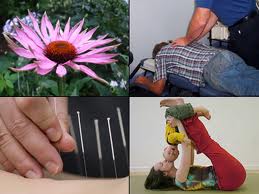It may be the last thing you want to do when you are having trouble focusing, are upset by negative news, or distracted by an inconsiderate co-worker, but a few minutes of mindfulness, yoga, or meditation may be just what you need to maintain good mental health.
“Hatha yoga and mindfulness meditation both focus the brain’s conscious processing power on a limited number of targets like breathing and posing, and also reduce processing of nonessential information,” explains Peter Hall, associate professor in the School of Public Health & Health Systems. “These two functions might have some positive carryover effect in the near- term following the session, such that people are able to focus more easily on what they choose to attend to in everyday life.”
After following thirty-one study participants who completed 25 minutes of Hatha yoga, 25 minutes of mindfulness meditation, and 25 minutes of quiet reading (a control task) in randomized order, Hall found that after both the yoga and meditation activities, participants performed significantly better on executive function tasks compared to the reading task. Specifically, goal-directed behavior, and the ability to control knee-jerk emotional responses, habitual thinking patterns and actions improved.
Moreover, Hall and his team also found that mindfulness meditation and Hatha yoga were both effective for improving energy levels, with Hatha yoga having significantly more powerful effects than meditation alone.
“There are a number of theories about why physical exercises like yoga improve energy levels and cognitive test performance. These include the release of endorphins, increased blood flow to the brain, and reduced focus on ruminative thoughts,” notes said Kimberley Luu, lead author on the paper.
There may be something particularly powerful about combining physical postures and breathing exercises with mindfulness meditation. The ability to observe thoughts, emotions and body sensations with openness and acceptance, seems to be a key component of improved executive functioning, while improvements in flexibility and strength come with a host of overall health benefits. Whether in helping us focus, appreciate what we have, or simply feel better physically, yoga, meditation, and the ability to shift our energy are fundamental to good mental health.
Related Online Continuing Education (CE) Courses:
Mindfulness: The Healing Power of Compassionate Presence is a 6-hour online continuing education (CE) course that will give you the mindfulness skills necessary to work directly, effectively and courageously, with your own and your client’s life struggles. Course #60-75 | 2008 | 73 pages | 27 posttest questions
Professional Development Resources is approved by the American Psychological Association (APA) to sponsor continuing education for psychologists. Professional Development Resources maintains responsibility for this program and its content. Professional Development Resources is also approved by the National Board of Certified Counselors (NBCC ACEP #5590); the Association of Social Work Boards (ASWB Provider #1046, ACE Program); the American Occupational Therapy Association (AOTA Provider #3159); the Commission on Dietetic Registration (CDR Provider #PR001); the Alabama State Board of Occupational Therapy; the Florida Boards of Social Work, Mental Health Counseling and Marriage and Family Therapy (#BAP346), Psychology & School Psychology (#50-1635), Dietetics & Nutrition (#50-1635), and Occupational Therapy Practice (#34); the Georgia State Board of Occupational Therapy; the New York State Education Department’s State Board for Mental Health Practitioners as an approved provider of continuing education for licensed mental health counselors (#MHC-0135); the Ohio Counselor, Social Worker & MFT Board (#RCST100501); the South Carolina Board of Professional Counselors & MFTs (#193); the Texas Board of Examiners of Marriage & Family Therapists (#114) and State Board of Social Worker Examiners (#5678); and is CE Broker compliant (all courses are reported within a few days of completion).
Enjoy 20% off all online continuing education (CE/CEU) courses @pdresources.org! Click here for details.






